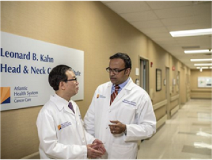
Understanding HPV-Related Head and Neck Cancers
Dr. James Wong and Dr. Tom Thomas are leading the treatment of HPV-related cancers of the head and neck at Morristown Medical Center and Atlantic Health System’s newly opened Atlantic HPV Center at Morristown Medical Center.(Photo: Courtesy/Atlantic Health System)
How Dentists Can Help Detect Cancer:
Dentists and dental hygienists are often the first line of defense against many oral diseases, including oral cancers. But new understanding of the human papilloma virus (HPV) may help dentists help patients detect head and neck cancers earlier, when they are most treatment.
Most people in the United States have been exposed to HPV, often early in life. Published articles report that 80 percent of the population in the United States may have been infected at one time. For most people, the body's immune system is able to clear the virus from the body. As a result, most individuals with HPV do not get cancer.
"HPV is now recognized as a major cause of head and neck cancers," said James Wong, MD, medical director, Leonard B. Kahn Head and Neck Cancer Institute and chair, Department of Radiation Oncology at Morristown Medical Center's Carol G. Simon Cancer Center. "For the first time, patients and those who suspect they may have this type of cancer will have somewhere to go to receive care from some of the nation's most expert, highly specialized physicians for HPV-associated head and neck cancer. We are the first center of this kind in New Jersey, and most likely, in the country."
"In fact, HPV-related cancers of the tonsil region and base of the tongue, or oropharynx, have tripled in the past several decades, making it a leading cause of head and neck cancer," said Erik Cohen, MD, surgical director, Leonard B. Kahn Head and Neck Cancer Institute at Morristown Medical Center.
These cancers are called oropharyngeal cancers. According to the National Institutes of Health, 70 percent of oropharyngeal cancers are HPV-related.
Those most affected by HPV-related oropharyngeal cancers are white males between the ages of 40 and 60, who often have no obvious risk factors for cancer. While these cancers used to occur mostly in older men, recently there has been an increase in those in their late 30s, 40s and 50s. Women are also affected, but at a much lower rate.
"Most of these cancers can be cured with minimally invasive surgical techniques and other treatments with few side effects, if detected early," said Tom Thomas, MD, MPH, director, Head and Neck Reconstructive Surgery and Transoral Robotic Surgery at Morristown Medical Center. "I strongly encourage anyone with risk factors or potential symptoms to see their doctor and get screened."

Dr. Tom Thomas at Morristown Medical Center says most HPV-related cancers can be cured with surgical techniques, if detected early.
Dr. Tom Thomas at Morristown Medical Center says most HPV-related cancers can be cured with surgical techniques, if detected early.
Symptoms of oropharyngeal cancers are often vague, and might include a persistent sore throat, hoarseness, lump on the neck, earache, pain when swallowing and unexplained weight loss. Some people do not exhibit any signs or symptoms.
Atlantic Health System announced the opening of the Atlantic HPV Center, part of the Leonard B. Kahn Head and Neck Cancer Institute at Morristown Medical Center. The Atlantic HPV Center is the first center dedicated to the diagnosis, treatment, research and survivorship of human papilloma virus (HPV)-associated cancers of the head and neck.
For more information about Leonard B. Kahn Head and Neck Cancer Institute or the Atlantic HPV Center, call 973-971-7352.

